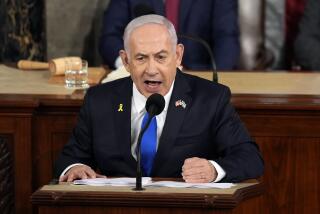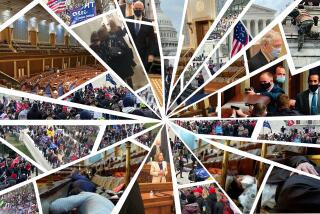Sunni league stakes claim to parliament blast
- Share via
BAGHDAD — A coalition of Sunni insurgent groups loyal to Al Qaeda claimed responsibility Friday for a bomb blast that killed a member of Iraq’s parliament, as legislators, many bearing wounds from the attack, gathered for a special session in the damaged building and vowed to stand firm.
The politicians’ defiant words came at a harrowing time for U.S. and Iraqi officials, who appear to be having little success calming Baghdad with a much-touted security plan now in its third month. The U.S. military Friday reported the deaths of three soldiers, bringing total American military fatalities to 3,297 since the U.S.-led invasion in March 2003, according to icasualties.org.
Two soldiers and two Iraqi interpreters were killed Thursday in an attack on their base in south Baghdad. Another soldier died Thursday when a roadside bomb exploded near his patrol south of the capital. Eight troops were wounded in the incidents, which brought to 50 the number of American personnel killed in the last two weeks. If the pace continues, April will be the bloodiest month for U.S. troops in Iraq since November 2004, when 137 died.
Friday’s parliament session was held under extraordinarily tight security, even by the usually stringent standards of the Green Zone, the fortified area in which Iraqi and U.S. government offices are housed.
Visitors to the building, who usually pass through metal detectors and at least two checkpoints, were put through additional layers of security that included pat-down searches and rummaging through handbags. Wallets, cellphones, cosmetic cases and eyeglass cases were opened when visitors entered and exited the perimeter of the building.
Many lawmakers live outside the zone, and some did not attend because vehicles are banned from the road outside the Green Zone from 11 a.m. to 3 p.m. each Friday to curb attacks on crowded public areas.
Those legislators who did attend made it clear that they were sending a message to their attackers.
“It is a challenge to them,” said Adnan Jeboori, whose face and hands bore deep red cuts from the blast. Both of his arms were wrapped in white gauze. Jeboori, speaking after the meeting, insisted he was not afraid of more attacks and said the blast would bring together Iraq’s parliament, which is beset by ethnic and religious strife.
Military officials revised the death toll from the blast, saying that a Sunni Arab lawmaker was the only person killed in addition to the suicide bomber. An earlier count of eight dead, including two legislators, was the result of confusion in the attack’s aftermath, a U.S. statement said.
The meeting Friday began with prayers for the slain lawmaker, Mohammed Awadh, and a wreath of red and white flowers was placed in his empty seat.
Parliament Speaker Mahmoud Mashadani said the attack would show that despite their differences, legislators could work together to build a democracy in the aftermath of Saddam Hussein’s ouster.
“In this meeting of ours, there is a clear message to all the terrorists and all those who dare try to stop this blessed process that we will sacrifice in order for it to continue,” he said.
Then, one by one, lawmakers stepped up to the podium to call for unity. One of them, Nada Ibrahim, who wore a neck brace, said her injuries had reminded her of the hardships suffered daily by Iraqis living outside the Green Zone, who don’t have access to the U.S.-run hospital where VIPs are treated.
“We must forget the pain and reunify,” Ibrahim said. “We have nothing except this unified Iraq. We must forget our differences.”
The unprecedented Friday meeting was a rare display of camaraderie among Iraq’s politicians, who since taking office after national elections in December 2005 have proved reluctant to bridge religious and ethnic divides. These differences have stalled legislation considered essential to Iraq’s social and economic progress.
But Thursday’s bombing differed from previous violence against politicians, which has targeted specific lawmakers or parties. This attack, committed by a suicide bomber in a cafeteria used by all lawmakers, was aimed at the post-Hussein Iraqi government as a whole.
In its Internet statement claiming responsibility, the so-called Islamic State of Iraq said one of its “knights” had infiltrated the “core of the cursed Green Zone ... headquarters of the infidel parliament rats.”
“Their time has come and they are now on the edge of oblivion,” said the statement posted on the group’s website.
The group also said the attack had exposed the failure of the U.S.-Iraqi Baghdad security plan, which was launched Feb. 13.
The parliament strike came hours after one of Baghdad’s best-known landmarks, the Sarafiya Bridge on the Tigris River, was severely damaged by a truck bomb. At least 10 people died in that attack.
Army Lt. Gen. Raymond T. Odierno, the commander of day-to-day military operations in Iraq, said the U.S. would not take over security for the Iraqi parliament building. U.S. soldiers protect the Green Zone perimeter, but further layers of security around the parliament are provided by Iraqi security forces.
Odierno condemned the bombing campaign being waged by insurgents opposed to the U.S. presence, and acknowledged that the United States must do more to protect Iraqis.
“It is clear that we still have a long way to go to provide security and stability to the people of Iraq,” he said.
In a teleconference from Baghdad with reporters in the Pentagon, Odierno said he could not confirm the claim of responsibility for the attack.
“My guess is, based on past events, they were probably somewhat involved, but we don’t know for sure yet,” he said.
There was more violence in Baghdad on Friday. Seven Iraqis, including a policeman, died in mortar and bomb attacks in the capital. Police also reported finding the bodies of five people who had been executed, apparently by sectarian death squads.
Times staff writers Mohammed Rasheed in Baghdad and Julian E. Barnes in Washington and special correspondents in Baghdad contributed to this report.
More to Read
Sign up for Essential California
The most important California stories and recommendations in your inbox every morning.
You may occasionally receive promotional content from the Los Angeles Times.













